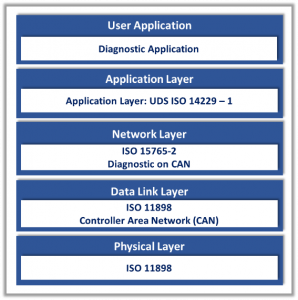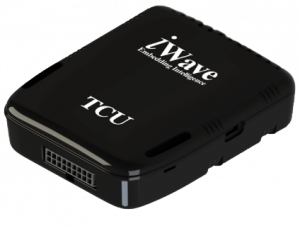Connected Vehicles Telematics: ISO 15765, SAE J1939 & UDS Protocol Stack
In order to support advanced analytics and diagnostics in CAN-based light-duty and heavy-duty vehicles, the iWave Telematics Control Unit is integrated with the ISO 15765, SAE J1939, and ISO 14229 UDS protocol.
ISO 15765 and SAE J1939 protocol defines exactly how messages are exchanged in a vehicle’s interconnected ECU system. ISO 14229 UDS protocol is the vehicle diagnostic protocol used to diagnose vehicles worldwide. These protocol stacks enable a simple and customizable API for handling diagnostics data over the CAN network.
ISO 15765 Protocol Stack for Passenger Vehicles:
ISO 15765 is an international standard and is the most widely used communication protocol in passenger and commercial vehicles since 2008. The ISO 15765 stack developed by iWave supports all the specifications of ISO 15765 protocol, in addition to the extended four variations of ISO 15765-4 CAN.
The stack supports both 29-bit and 11-bit CAN identifiers with standard baud rates of 250 kbps and 500 kbps. The stack effectively determines the underlying ISO 15765-4 CAN that is supported by the vehicle allowing the device to interpret all ISO 15765 standard messages from Vehicle ECU.
The following are the key features of ISO 15765 CAN Stack:
- Based on ANSI C source code
- Supports four variants of ISO 15765-4 CAN
- Supports Multi-frame message filtering
- Customizable stack features
- Provide access to retrieve manufacture specific vehicle data
J1939 Protocol Stack for Heavy-Duty Vehicles:
 The SAE J1939 stack developed by iWave is based on the ANSI C standard, supports all the specifications of the SAE J1939 protocol needed for collecting data from buses and trucks. The stack works with an extended 29-bit CAN identifier with all the standard baud rates (100kbps, 125kbps, 250kbps, 500kbps, and 1000kbps) supported.
The SAE J1939 stack developed by iWave is based on the ANSI C standard, supports all the specifications of the SAE J1939 protocol needed for collecting data from buses and trucks. The stack works with an extended 29-bit CAN identifier with all the standard baud rates (100kbps, 125kbps, 250kbps, 500kbps, and 1000kbps) supported.
The iWave stack implements an auto baud rate detection mechanism that allows the external diagnostic tool/data logger device to find the baud rate supported by the vehicle and initiates the communication between the device and vehicle ECU. The stack facilitates the device to interpret all types of SAE J1939 standard messages from the Vehicle ECU.
The following are the key features of the SAE J1939 Stack:
- Peer-to-peer messages and broadcast communication
- Standardized messages for the overall vehicle communication
- Has point-to-point (node addressing) and global addressing (message addressing)
- Maximum reliability
- Excellent error detection & fault confinement
- Collision-free bus arbitration
- Supports vehicle diagnostics with the support of J1939 diagnostic layer services
- Supports Multi-frame message handling
- Customizable stack features
- ECU addressing feature
ISO 14229 UDS Protocol Stack for Automotive Diagnostics:
iWave has designed the UDS protocol stack to be fully customizable, allowing users to specify feature sets and fine-tune the stack to meet the end application requirements of the Client device. This protocol is derived from the ISO 14230-3 (KWP-2000) and ISO 15765-3 (Diagnostic Communication over the CAN (DoCAN). It is used for vehicle diagnostic, ECU firmware flashing, and many more such functions.
The UDS protocol offers 6 different Client services for the categories of tasks to be performed on the server such as:
- Diagnostic and communication management
- Data Transmission
- Stored Data Transmission
- Input/Output Control
- Remote activation of routine
- Upload/Download
Telematics Control Unit with ISO 15765, SAE J1939, and ISO 14229 UDS Protocol Stack:
 The Telematics Control Unit is equipped with multiple CAN Interfaces, wireless connectivity options such as 4G, Wi-Fi and Bluetooth and powered by a powerful processor. The TCU is integrated with various protocol stacks ensuring compatibility to different types of vehicles.
The Telematics Control Unit is equipped with multiple CAN Interfaces, wireless connectivity options such as 4G, Wi-Fi and Bluetooth and powered by a powerful processor. The TCU is integrated with various protocol stacks ensuring compatibility to different types of vehicles.
With the protocol stack, the Telematics Control Unit can communicate directly with the vehicle and retrieve critical parameters specified by the manufacturer. Parameters such as speed, engine data, and emission data obtained in the form of Diagnostic Trouble Codes (DTC) are decoded and sent to customer-specified Cloud-based applications for analysis. Any rare occurrences/defects can be easily detected by analyzing the codes, thereby enabling efficiency in the vehicle’s remote management and overall performance.
Value proposition of ISO 15765, J1939, and UDS protocol stack:
- Easy to Use APIs
- End to End solution offerings for Telematics Solutions
- Supported in all available kernel versions.
- Development of APIs for integration with customer-specific hardware platform and application
More detailed information on the Telematics Control Unit can be found here or a quick video can be viewed here.
To get in touch with us for enquiries and further information, please write to mktg@iwavesystems.com or contact our Regional Partners.


